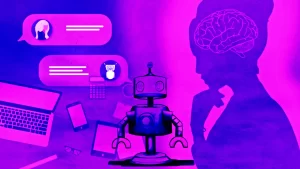Artificial Intelligence (AI) interviews have become increasingly common in the world of job recruitment. These interviews leverage AI technology to evaluate job candidates efficiently. The primary objective of AI interviews is to streamline the hiring process by reducing the time and effort that human recruiters traditionally invest.
What Is an AI Interview?
AI interviews involve using artificial intelligence(AI) to evaluate job applicants. They are often the initial screening stage before candidates have any direct human interaction in the hiring process. AI interviews can take various forms, including online assessments, video interviews, or chatbot interactions. The questions asked are typically designed to assess a candidate’s skills, qualifications, and suitability for the role.
AI interviews leverage AI to assess candidates’ qualifications, skills, and suitability for a particular role. Instead of human interviewers, AI algorithms analyze your responses, making the hiring process more streamlined and objective.
The Benefits of AI Interviews
AI interviews offer several advantages to both employers and job seekers. For employers, they provide a more efficient and standardized screening process, enabling them to identify the most qualified candidates quickly. Additionally, AI interviews can help reduce bias in hiring decisions, as they focus on objective criteria rather than personal impressions.
Job seekers also benefit from AI interviews. They can complete interviews on their own time, which is particularly useful for those with busy schedules. AI interviews also offer a level playing field for all candidates, allowing their skills and qualifications to shine through, regardless of their background.
AI interview Tips
Now that we understand what AI interviews are and their benefits, here are some valuable tips for success in AI interviews:
- Understand the Format: AI interviews come in various formats. They can involve video interviews with automated analysis of your body language and speech, coding tests with instant grading, or even AI-driven quizzes. Familiarize yourself with the specific format you’ll be facing so you can prepare accordingly.
- Review Common Questions: AI interviews often include standard interview questions. Brush up on common questions about your qualifications, experience, and skills. Develop concise and compelling responses.
- Practice Video Interviews: If your AI interview involves a video component, practice speaking confidently and clearly in front of the camera. Ensure good lighting, a clutter-free background, and test your equipment to avoid technical issues.
- Technical Skills Assessment: For technical roles, expect coding challenges and technical questions. Practice coding problems and algorithms relevant to the job, and take advantage of online platforms like LeetCode or HackerRank for practice.
- Keywords and Phrases: AI often scans your responses for specific keywords or phrases related to the job description. Tailor your answers to include these keywords naturally to increase your chances of passing the initial screening.
- Be Concise: Keep your responses concise and to the point. Avoid rambling or providing excessive details. AI algorithms prefer straightforward, relevant answers.
- Emphasize Soft Skills: Highlight your soft skills and problem-solving abilities in your responses. AI can evaluate these skills by analyzing your language and responses.
- Customize Your Resume: Ensure your resume reflects the skills and experience relevant to the job description. AI often cross-references your resume with the job requirements.
- Prepare for Behavioral Questions: AI can ask behavioral questions to assess your personality and work style. Practice answering these questions using the STAR (Situation, Task, Action, Result) method.
- Stay Calm: Don’t let the fact that you’re being assessed by AI add stress to your interview. Treat it like any other interview and stay calm and composed.
- Follow-Up: After the AI interview, send a thank-you email to any human contact you’ve had during the process. This demonstrates professionalism and appreciation for the opportunity.
- Continuous Learning: AI interviews may evolve, so stay up-to-date with AI interview trends and technology. Adapt your preparation strategy accordingly.
Common Pitfalls to Avoid: While preparing for AI interviews, avoid using jargon that the AI may not understand, speaking too quickly, or providing overly lengthy responses. Stay concise and clear in your answers.
Mastering AI interviews is a valuable skill in today’s job market. Remember, while AI interviews can expedite the hiring process, they are still evaluated by humans at some point. So, focus on both impressing the AI algorithms and making a positive impression on potential employers. With practice and preparation, you can increase your chances of success in AI interviews and land the job you desire. If you are preparing for AI interviews then, Best of luck with your AI interviews!











